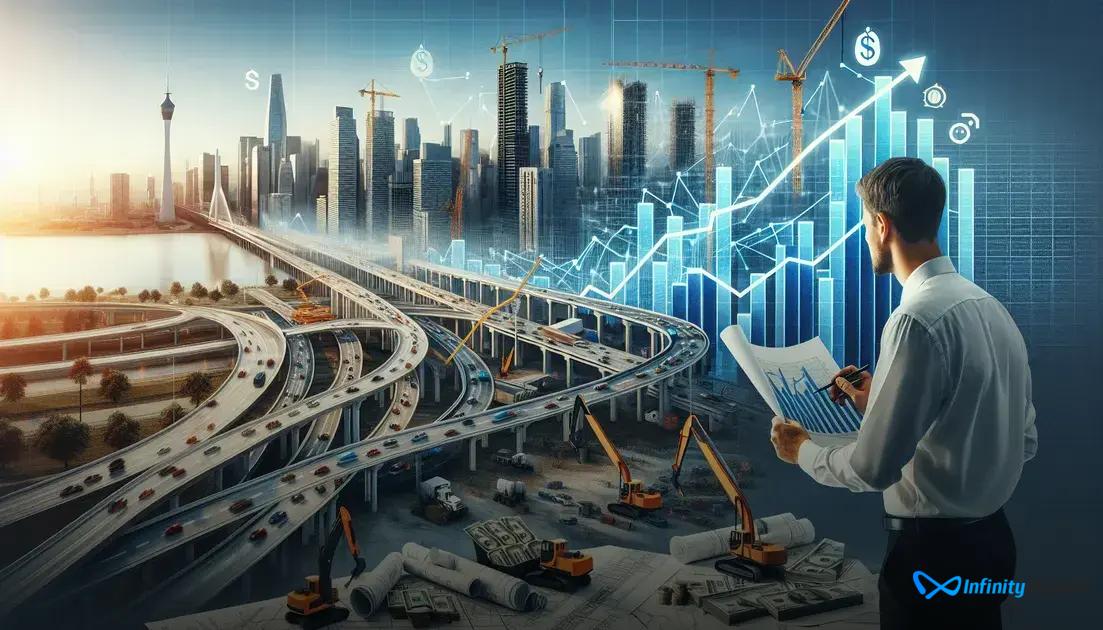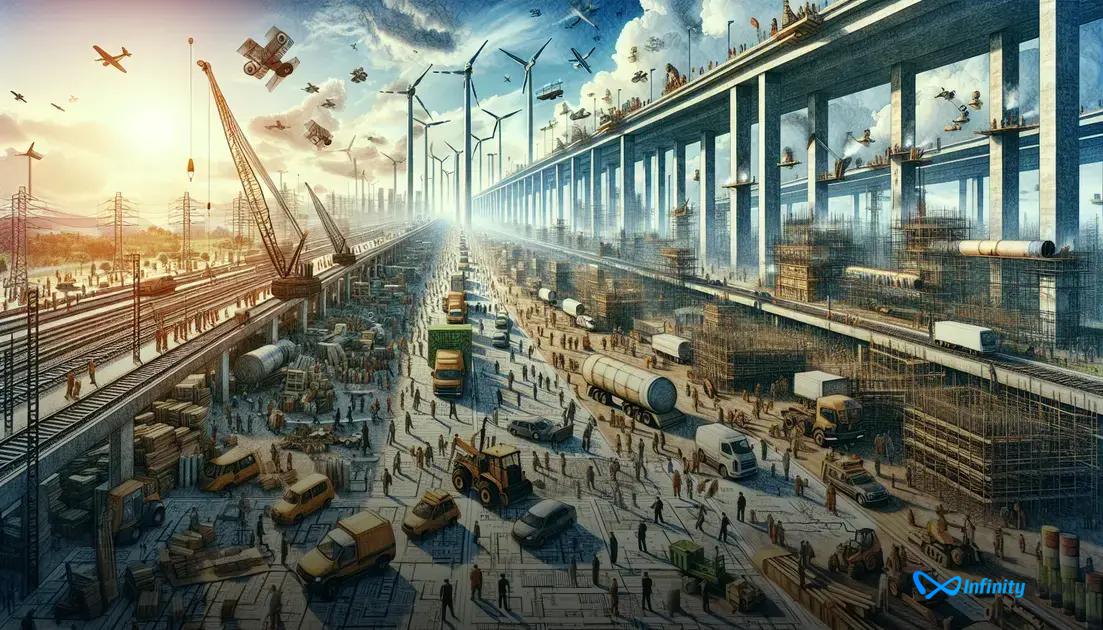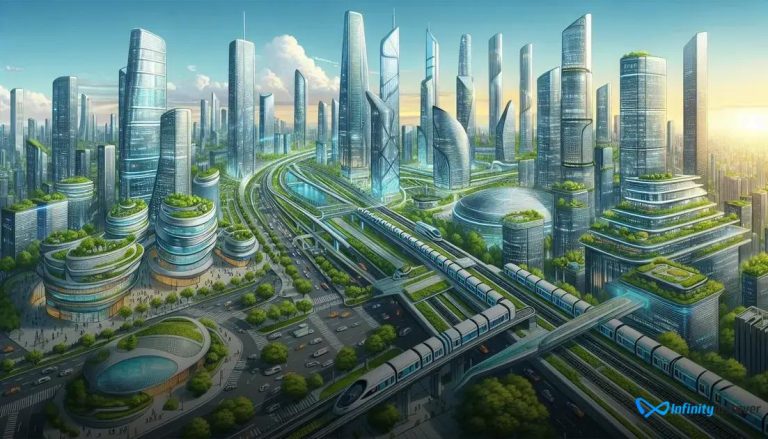Infrastructure projects are pivotal in shaping the future of any city or nation. From urban development to economic impacts, these projects lay the foundation for sustainable growth.
The role of infrastructure projects in urban development
Infrastructure projects serve as the backbone of urban development. By establishing critical facilities like roads, bridges, and public transport systems, they significantly enhance the quality of life for city dwellers. These projects facilitate efficient movement of goods and people, reducing traffic congestion and travel time. Urban planners carefully design these projects to integrate seamlessly with existing structures, aiming for minimal disruption.
Modern urban development increasingly focuses on sustainable infrastructure. Eco-friendly innovations, such as renewable energy sources and green building materials, play a crucial role. These advancements not only reduce environmental impact but also promote long-term economic benefits by lowering operational costs. Sustainable infrastructure can also attract investments by enhancing a city’s appeal to tech-savvy companies and environmentally conscious residents.
As cities expand, the demand for robust infrastructure projects grows. Such projects are crucial to accommodate increasing populations and foster economic growth. By investing in infrastructure, cities can bolster their economic resilience, create jobs, and stimulate local businesses. Well-planned infrastructure projects also enhance public safety, improve access to essential services, and contribute to the overall productivity of urban areas.
Economic impacts of large-scale infrastructure projects

Economic Growth
Large-scale infrastructure projects are known to drive significant economic growth. By creating jobs during the construction phase and providing long-lasting public services, these projects stimulate local and national economies. For example, new highways reduce transportation costs and improve productivity, thereby boosting trade and commerce.
Job Creation
One of the direct impacts is the creation of numerous job opportunities. These jobs are not only in construction but also in related industries such as engineering, manufacturing, and services. Employment generated during and after the project contributes to raising living standards and reducing unemployment rates.
Increased Investments
Infrastructure improvements often lead to increased investments from both domestic and international investors. Efficient infrastructure attracts businesses, which prefer areas with reliable transportation, utilities, and communication systems. As a result, regions with robust infrastructure are more likely to experience economic diversification.
Enhanced Public Revenue
Government revenue can see a substantial increase through taxes and tariffs associated with new infrastructure. Enhanced public services such as better roads, ports, and airports make it easier to collect tolls and taxes, contributing further to public funds.
Indirect Economic Benefits
Indirect benefits include the fostering of innovation and entrepreneurship. Improved infrastructure facilitates easier movement of goods and people, enhancing supply chains and opening new markets for businesses. This indirectly drives economic activity and growth, creating a snowball effect of prosperity.
Sustainable infrastructure: Eco-friendly innovations
One of the most significant advancements in sustainable infrastructure involves integrating eco-friendly innovations into construction projects. Utilising renewable energy sources, such as solar and wind power, can greatly reduce the carbon footprint of new developments. Additionally, the incorporation of green building materials, like recycled steel and sustainable concrete, helps in making structures more environmentally friendly.
Water conservation is another crucial element, with modern infrastructure projects often featuring advanced water recycling systems and rainwater harvesting techniques. Urban areas are now increasingly designed with green spaces, such as parks and rooftop gardens, to improve air quality and enhance the wellbeing of residents.
Smart Grids and Efficient Energy Use
Smart grids represent one of the cutting-edge innovations in sustainable infrastructure. These systems optimise energy use by automatically adjusting the energy distribution based on real-time data, thus improving efficiency and reducing waste. Combined with smart meters, they allow consumers to monitor their energy use and make more sustainable choices.
Electric and Public Transport
Reducing emissions from transportation is essential for achieving sustainability goals. Investments in electric vehicle (EV) infrastructure, such as charging stations, are growing rapidly. Public transport systems are also being revamped to include electric buses and trains, which emit fewer pollutants and offer a greener alternative to traditional vehicles.
The implementation of these eco-friendly innovations not only highlights the commitment to sustainability but also sets a precedent for future infrastructure projects. By prioritising green technologies and methods, we can create a more resilient and environmentally responsible urban landscape.
Key challenges in implementing infrastructure projects

One of the key challenges in implementing infrastructure projects is managing the financial aspects. Securing funding is often a major hurdle, requiring extensive planning, negotiations, and sometimes international partnerships. Another significant challenge is regulatory compliance. Navigating the complex web of local, national, and sometimes international regulations can delay projects significantly.
Stakeholder management is also crucial. Keeping the community, investors, and government officials informed and satisfied requires efficient communication strategies and can be quite demanding. Furthermore, technical challenges often arise, especially in areas with difficult terrains or in projects requiring advanced engineering solutions. These technical issues call for skilled professionals and innovative approaches.
Last but not least, environmental concerns play a pivotal role. Ensuring that the project’s environmental impact is minimal or compensated for through various initiatives adds an extra layer of complexity. Balancing progress with sustainability is a demanding but necessary challenge in today’s context.
Future trends: What’s next for infrastructure projects?
The future of infrastructure projects is likely to be shaped by several key trends. One significant development is the incorporation of advanced technologies. Artificial intelligence (AI), machine learning, and big data analytics will revolutionise project planning, execution, and maintenance. These technologies can enhance precision, improve efficiency, and reduce costs.
Sustainability will continue to be a major focus. There will be a growing emphasis on using eco-friendly materials and renewable energy sources to ensure long-term viability. Green building certifications and stringent environmental regulations will guide many future projects, fostering innovation in design and construction.
Smart Cities and Integration
Another trend is the development of smart cities. Infrastructure projects will increasingly integrate with Internet of Things (IoT) devices, creating interconnected urban environments. This integration will lead to better resource management, improved transportation systems, and enhanced quality of life for residents.
The financing of infrastructure projects is expected to evolve. Public-private partnerships (PPPs) and alternative financing models will become more prevalent, enabling the execution of large-scale projects that would be otherwise unattainable with traditional funding methods.
In terms of project management, the industry will see greater adoption of Building Information Modelling (BIM). BIM allows for more accurate visualisation, planning, and collaboration among stakeholders, significantly enhancing project outcomes.
The increasing complexity and scale of projects will also necessitate enhanced risk management strategies. This involves identifying potential risks early and implementing measures to mitigate them, thus ensuring smoother project delivery.
In conclusion, future infrastructure projects are set to benefit greatly from technological advancements, sustainable practices, smart integrations, innovative financing, and improved management techniques, paving the way for more efficient and forward-thinking developments.





